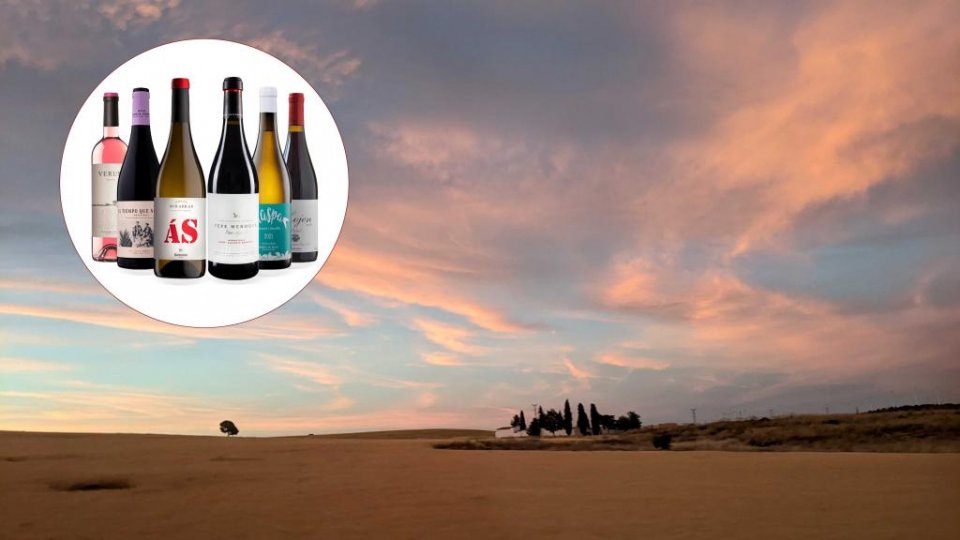Southern Spain is a big patch. It stretches all the way round from Valencia on the Mediterranean coast to Huelva on the Atlantic and the border with Portugal. In between, it takes you through the Levante region, up into the Sierra Penibética range – which includes the Sierra Nevada and mainland Spain’s highest mountain, the 3,478 metre Mulhacén – and winds up in the winemaking marvel that is the sherry triangle.
For a wine lover, there’s plenty to cover. Too much for a single article. So, we’re going to take you on a short tour through some of our favourite vineyards. These are home to some innovative winemakers and cracking grapes like Monastrell or Bobal. Not to mention some of the intriguing still white wines that are making their mark in the land of sherry.
And if any of these vineyards pique your curiosity, you can try some of the wines they make in our latest wine club offer. Take a look at the wines now or read on and follow the link at the end of the article.
So, without further ado, let’s get our journey underway.
We begin in the east in the small village of Llíber. Here we find Pepe Mendoza, a second generation Alicantino winemaker who, along with wife Pepa, their three children and dachshund Syrah, runs the Pepe Mendoza Casa Agrícola winery.
Sustainability and respect for tradition are at the heart of Pepe’s approach, and he is passionate about local grape varieties and winemaking techniques that have been handed down for generations ever since the time of the Romans. His Casa Agrícola Tinto is a succulent blend of Monastrell, Giró and Alicante Bouschet grapes with bags of Mediterranean herb (think pine, rosemary, thyme and rockrose) and just a touch of orange peel. A delicious wine that’s really representative of this part of Spain.
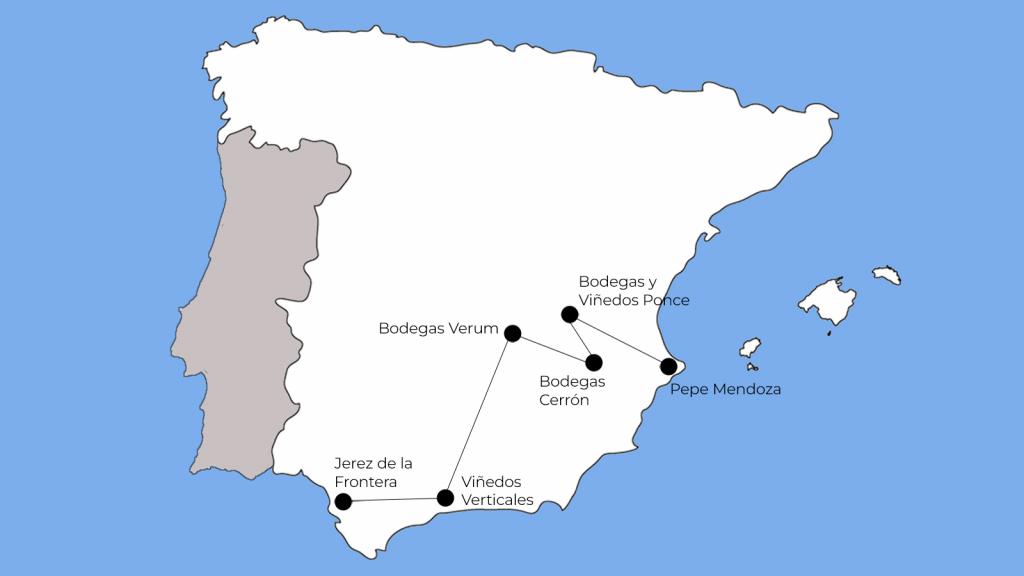
A detour inland takes us to Bodegas y Viñedos Ponce in Manchuela, a kind of transition region between the warmer, drier Mediterranean coast and the higher, harsher Castillian meseta. Another family business, Ponce’s speciality is the Bobal grape. Traditionally a bit of an Iberian workhorse, Bobal is now enjoying a revival with winemakers who appreciate its delicious fruit like raspberry and cherry, floral touches like violets, and even the odd lick of dark chocolate. Clos Lojen is a brilliant example, with quite an earthy nose and bags of complexity for an organically certified wine that retails for under €10 a bottle.
A bit further inland and we cross over into Castilla-La Mancha for a whistle-stop visit to Bodegas Verum, one of south-central Spain’s most interesting wineries. Slap bang in the middle of Spain’s biggest winemaking region, Verum is a family-run affair which blends traditional grapes and winemaking methods with a strong focus on climate adaptation. Their house rosé, Verum Rosado, is a refreshingly light, organic rosé, perfect for the summer months. Pale raspberry pink, it’s bursting with aromas of fresh strawberry and cherry; ideal to enjoy chilled on its own or the perfect pairing for spicey food or rice dishes.
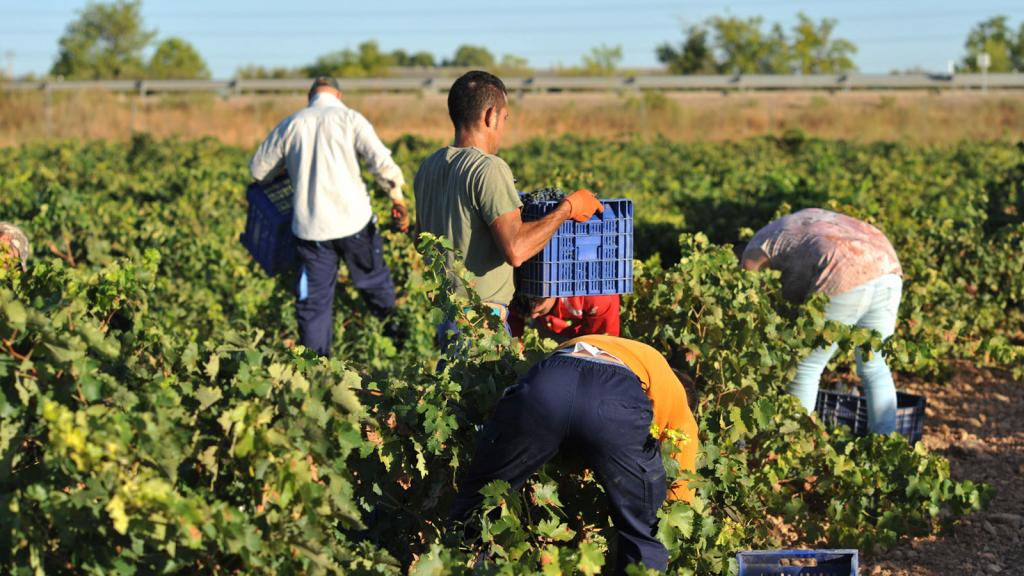
Point south-east again back towards the sea, and we’re into DO Jumilla, home to the Monastrell grape and one of Spain’s most exciting family-run wineries, Bodegas Cerrón. Siblings Juanjo, Lucía and Carlos Cerdán are the fourth generation in a family of local winegrowers and winemakers in the village of Fuente Alamo in the province of Albacete. They use traditional organic and biodynamic methods to farm their 26 hectares divided into a multitude of small vineyard plots. Each plot is bursting with wonderful old vines, planted between 70 and 100 years ago.
Character, complexity and freshness are the watchwords here, as demonstrated by El Tiempo Que Nos Une, a delicious red wine made with 100% Monastrell and packed with ripe blackcurrant and dark cherry, notes of black pepper and a lick of sweet spice. In days gone by, winemakers would set aside a few bottles of young wine to be drunk after the harvest by family and friends. This wine is reminiscent of those wines, and even takes its name from them: ‘The time that brings us together.’ What better excuse to get some friends together?
But there’s no time to mingle, there’s plenty more to discover. Continuing our journey, we whizz through Almería and Granada and into the province of Málaga where, behind the coastal sprawl, things get very hilly and very interesting. Drive just 10 km inland from the sea and already we’re at over 400 metres above sea level and well placed to visit some really exciting young winemakers working with local grapes like Pedro Jiménez or Doradilla planted in slate soil and even harvested by mule to give wines crackling with minerality and expression.
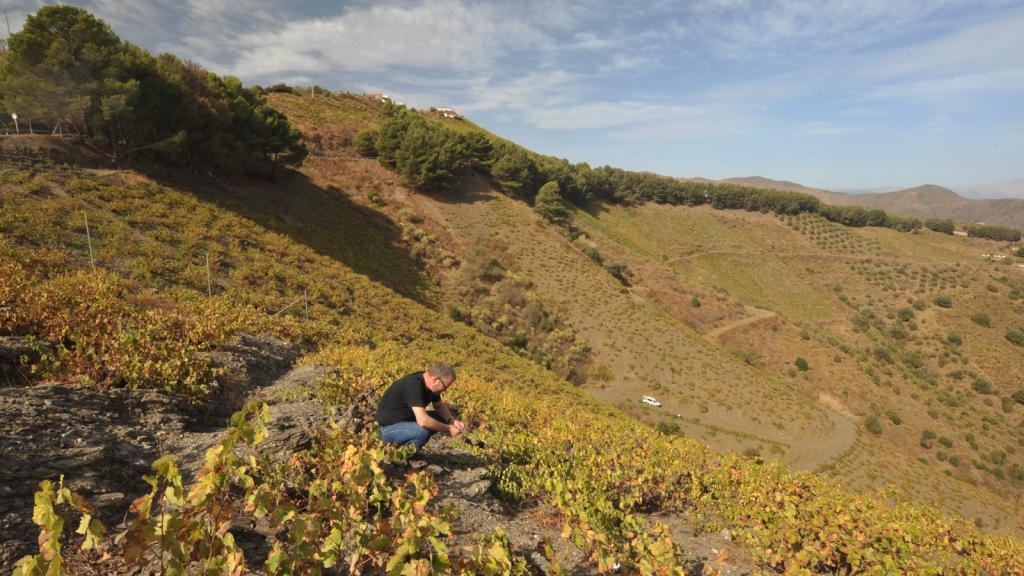
Viñedos Verticales – literally ‘Vertical Vineyards’ – showcases the fantastic winemaking potential of the Axarquía – an array of historic mountain vineyards between 400 and 900 metres above sea level just to the east of the city of Málaga, where the steep slopes making mechanized farming virtually impossible.
With the help of their trusty mule, Juan Muñoz and Vicente Inat farm just five hectares of vineyard around the hamlet of Moclinejo. The majority of the vines are Moscatel of Alejandria, combined with some Pedro Ximénez or rare local varieties like Romé or Doradilla. Their flagship white wine, La Raspa, is packed with floral and mineral aromas with some notes of aniseed. Intense and luscious on the palate, it has magnificent acidity and an intriguing, slightly saline finish.
A couple of hundred kilometres due west of Málaga and we are, of course, in the town of Jerez de la Frontera. Now all the wonderful, fortified wines produced in the area known as the ‘sherry triangle’ (think fino, manzanilla, amontillado etc) are, for many wine connoisseurs around the world, Spain’s best-kept secret. And they’re undergoing a bit of a revival at the moment thanks partly to their huge potential for food pairing.
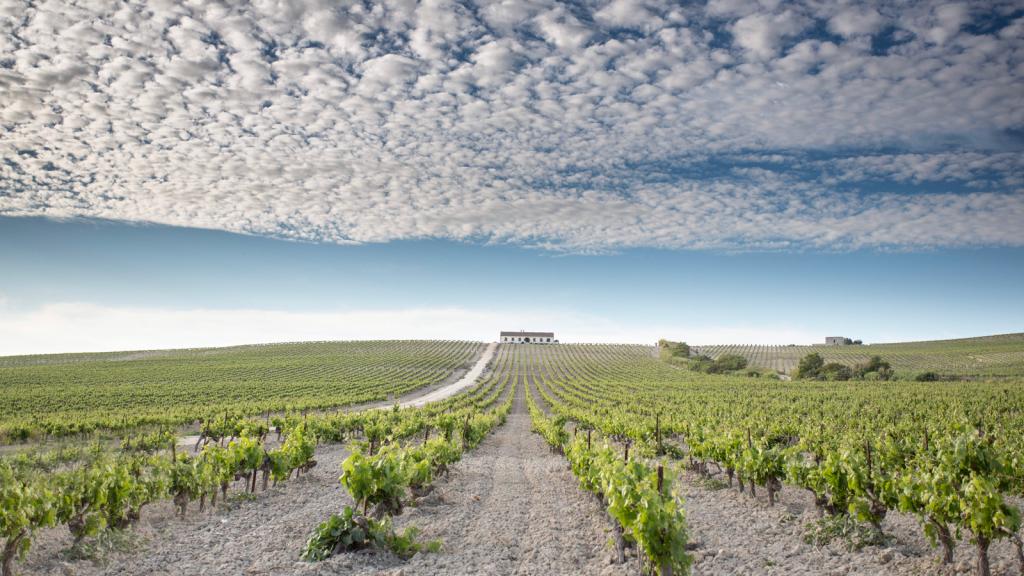
But in this south-west corner of Spain facing the Atlantic, where the Palomino grape reigns supreme, there are also some brilliant still wines, or vinos de pasto as they’re known locally. Ás de Mirabrás is made by Barbadillo, one of the most established wineries in the Jerez region with a winemaking history stretching back to 1821. It’s made with a selection of Palomino grapes grown in the famous, chalky white albariza soil in different plots spread across various historic pagos (vineyard areas) of Almocadén, Cerro Pelado, Macharnudo Alto, Santa Lucía and Balbaína.
Fresh but complex with a good dose of sapidity – a word beloved of sherry fans which refers to a kind of wet stone-like minerality in a wine – Ás de Mirabrás goes brilliantly with a sumptuous seafood paella, roast vegetables or a simple plate of cheese.
Taste the wines with our special offer!
So, there we have it. A quick tour through just a few of the winemaking regions of southern Spain. If you’d like to try the wines from some of the vineyards mentioned in this article, why not take a look at our special wine club offer featuring six wines that represent the best of southern Spain. They’re all exceptional wines, made by small-scale producers, and are excellent value for money. And we’re offering free shipping to mainland Spain for all Spain in English readers. Take a look at the offer and get your order in now.
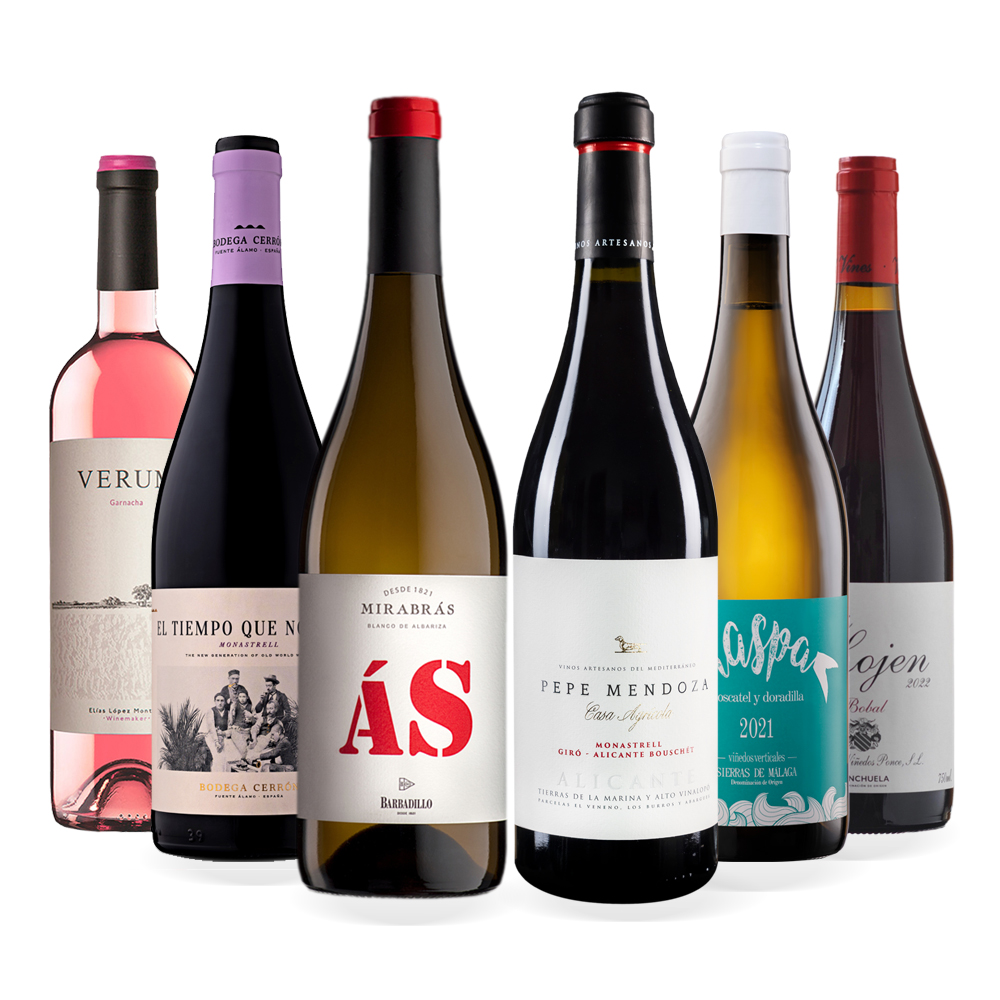 Matthew Desoutter is a wine writer and owner of Simply Spanish Wine.
Matthew Desoutter is a wine writer and owner of Simply Spanish Wine.
Sign up for the FREE Weekly Newsletter from Spain in English.
Please support Spain in English with a donation.
Click here to get your business activity or services listed on our DIRECTORY.
Click here for further details on how to ADVERTISE with us.

